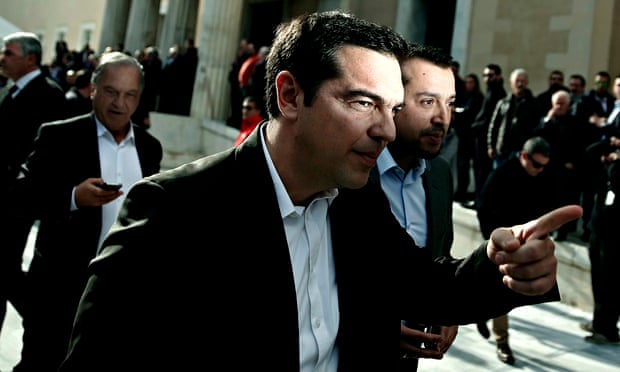Helena Smith and Jill Treanor Tuesday 30 December 2014
Stavros Dimas fails to win required number of votes, meaning parliament must now be dissolved and poll held within 30 days

Alexis Tsipras, leader of the leftist Syriza party, leaves parliament after the vote. Photograph: Alkis Konstantinidis/Reuters
Fears were growing on Monday night of a fresh crisis in the Eurozone after Greece failed to elect a head of state, triggering a snap election that is tipped to bring radical, anti-austerity leftists to power.
The Athens stock exchange slumped by more than 10% at one point as concerns mounted over the political turmoil likely to hit the twice bailed-out country. The effective interest rate on the nation’s three-year debt soared to more than 12% – signalling investor fears that Greece will not be able to repay its loans in the short term.
Elections were called for 25 January after the government failed to find enough votes to elect its preferred candidate for president, the former European commissioner Stavros Dimas. With the vehemently anti-cuts Syriza opposition ahead in the polls, the campaign will now revive the debate about austerity policies across the Eurozone and raise questions over the harsh terms attached to Greece’s €240bn (£188bn) bailouts.
The leftists have declared that renegotiation of the accords Athens has signed with the EU, European Central Bank (ECB) and International Monetary Fund – the lenders that have kept the country afloat – will be among its top priorities.
Syriza would also seek to write off the country’s monumental €320bn debt – an aim that has revived fears of Greece clashing with creditors and being ejected from the Eurozone.
The new threat comes six years after the country’s near economic collapse first sent panic through global markets and two years after prime minister Antonio Samaras came to power with his conservative-dominated two-party alliance.
Following the vote, Syriza’s leader, Alexis Tsipras, said the country had experienced “a historic day”, adding: “In a few days the Samaras government, which pillaged the country, will belong to the past, as will the memoranda of austerity.”
Athens’s 300-seat house voted by 168-132 in favour of Dimas, the sole candidate for the post of president – falling short of the 180 votes required for his installation.
Market analysts said there could be wider repercussions, including for the ECB, which is due to meet just days before the election to discuss monetary policy and debate the prospect of embarking on injecting billions into the Eurozone's economies through quantitative easing (QE) – or electronic money-printing.
The ECB has so far held off from QE despite speculation earlier this month that it was ready to act to bolster economic growth in the face of inflation which has fallen to 0.3%, dangerously close to outright deflation.
Alastair McCaig, market analyst at IG UK, said: “Although this is a specific issue for Greece, it will raise fresh fears over the fate of the Eurozone and the timelines for the possible implementation of a European version of QE. 2015 could see an escalation in the debate over austerity, with the same old north-south divide on what is proportional still raging”.
The IMF played down fears of any immediate funding crisis for Greece and will embark on its delayed review of the terms attached to the bailout programme once the new government is in place.
“Discussions with the Greek authorities on the completion of the sixth review of the programme … will resume once a new government is in place, in consultation with the European commission and the ECB. Greece faces no immediate financing needs,” the IMF said.
The EU’s commissioner for economic and finance affairs, Pierre Moscovici, said the Greeks needed “a strong commitment to Europe” and support “for the necessary growth-friendly reform process will be essential for Greece to thrive again within the euro area”.
After failing to find enough support, Dimas said: “The number of 168 votes is a clear parliamentary majority but as the constitution foresees it does not allow my election … what is important, now, is the interests of the country and the Greek people … what unites us is Greece.”
Greek law says parliament must be dissolved within 10 days and a poll held within 30. Samaras said: “Tomorrow I will go to the president of the republic to request snap polls as early as possible on 25 January. It is the hour of democracy, which means truth and responsibility, not populism.”
Christos Pappas, the jailed second-in-command of the neo-Nazi Golden Dawn party, was the first to announce he would not be voting for the government’s candidate. Independent MPs, whom Samaras had hoped to sway in this, the final round of a three-stage vote, followed suit.
Stony-faced lawmakers looked on as Golden Dawn MPs, accentuating the deep political divisions now plaguing Greece, screamed at Samaras: “We’ll see you in prison” at Samaras.”
Samaras immediately called a cabinet meeting for 2pm local time on Monday to decide on government strategy in the coming days.
Emerging from parliament, he said: “We did whatever we could for a president to be elected by today’s parliament and to avert early elections which hold serious dangers and which the majority of Greeks don’t want … unfortunately a minority of 132 parliamentarians are dragging the country to snap polls.”
![The [Greek] European Tragedy](https://blogger.googleusercontent.com/img/b/R29vZ2xl/AVvXsEiWKI5s90SFm1wWTk6bs4p7CgslaC2SnYPsrZhb-B-smOufNNCSxCvpBLI9hOB-LsXZjir_PNmEiMk2-E62F3xkg96IoC6QFAaZAnPRTVH340IN9WBRmWJqPkjWlgyRj3zpALp7h6hvA58/s920/GkBack_new.jpg)